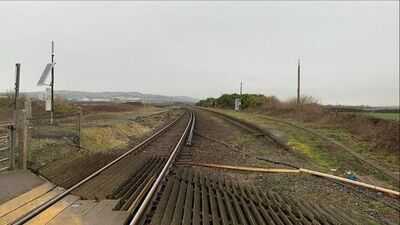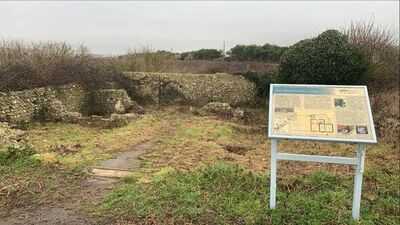
Once a bustling seaside town, Tide Mills in Sussex is now little more than a ghost of its former self after its inhabitants were forced to leave.
Today, the site is scattered with crumbled bricks and mortar. You'd be forgiven for not realising a thriving village once stood on this peaceful marshland. Yet, less than a century ago, this small corner of the south coast was alive with industry and community spirit.
As its name suggests, the tight-knit settlement was built around a tidal mill that began operating in 1761. Initially modest, local men loaded barges with corn and wheat while women darned flour sacks, living in a handful of cottages clustered around the mill.
Tide Mills witnessed bloody drama in 1795 when hungry English troops fighting in the Napoleonic Wars stole 200 sacks of flour, which resulted in their swift capture and execution.
A decade later, the town expanded significantly when William Catt purchased the mill. Fascinated by exotic fruit, he built a vast greenhouse where he grew figs and pineapples, according to the Tide Mills Project. But it wasn't all sweetness and light-Catt ruled the village with an iron fist, enclosing it with walls and enforcing a strict 10:10 pm curfew. When some villagers returned 10 minutes late from the pub, he revoked their beer tokens and banned them from leaving for a month.

Two major events marked the decline of Tide Mills' prosperity. In 1864, the railway reached Seaford, making it cheaper and easier for farmers to send grain to London for milling. Just over a decade later, a devastating storm damaged the mill and filled much of its pond with stones from the beach. It never returned to full operation.
"The way people lived changed a lot over the life of Tide Mills, especially when the Mill stopped working for good in 1883. The Mill, which provided work for so many men, had stopped and the beating heart of the village fell silent. The Mill buildings were converted and used as warehouses where some of the men continued to work," the Tide Mills Project explains.
Gradually, community pillars like the school, blacksmith, and carpenters disappeared, but the residents stayed, surviving as best they could.
In the early 20th century, Tide Mills experienced a brief revival. A large radio mast was built to guide ships, and a seaplane base opened in 1917, bringing soldiers, noise, and two large hangars to the beach.
However, the village's end was approaching. In 1930, Parliament passed a Housing Act allowing local authorities to condemn homes unfit for habitation.

With little work or investment, Tide Mills fell into disrepair. In 1936, a petition called for villagers' eviction due to poor living conditions. A 1937 Daily Mail headline dubbed it 'The Hamlet of Horror,' describing the squalor-no running water, sewage, or electricity.
Water came from a single shared standpipe. Waste was dumped into the sea, and each home had a small outside earth closet that residents had to empty manually.
Later that year, Seaford council declared Tide Mills unfit for habitation and issued an eviction order, giving residents nine months to leave. All residents, including those at Chailey Marine Hospital, were evicted, with some forcibly removed in 1940.
Today, the ruins barely hint at the once-thriving village. Only Station House, near the railway line, is clearly identifiable.
In 1940, war veteran Stan Tubb was allowed to stay two extra months due to his specialised knowledge valuable to troops stationed nearby during WWII.
All village buildings and the hospital were demolished to maintain clear sightlines for defending soldiers and to avoid obstruction during potential attacks.
Now, the ruins are open to explorers and Tide Mills has become a popular route for walkers and cyclists.
You may also like

Bihar polls: Mukesh Sahani emerges as Mahagathbandhan's wildcard; is Congress the weakest link?

India committed to ensuring light of human rights shines undimmed across our world, says Justice Kant

Russia and Belarus reinstated by IPC but unlikely to compete at 2026 Paralympic Winter Games

BCCI seeks to criminalise match-fixing 'to protect cricket'

"Pakistan will now think twice before attempting any misadventure against India": Rajnath Singh on Op Sindoor







